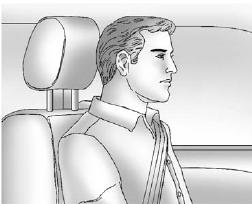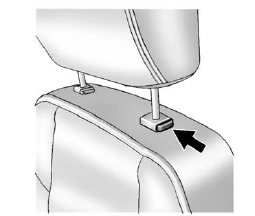Front Seats
The vehicle's front seats have adjustable head restraints in the outboard seating positions.
WARNING!
With head restraints that are
not installed and adjusted
properly, there is a greater
chance that occupants will suffer
a neck/spinal injury in a crash.
Do not drive until the head
restraints for all occupants are
installed and adjusted properly.

Adjust the head restraint so that the top of the restraint is at the same height as the top of the occupant's head. This position reduces the chance of a neck injury in a crash.

The height of the head restraint can be adjusted. Pull the head restraint up to raise it. Try to move the head restraint to make sure that it is locked in place.
To lower the head restraint, press the button, located on the top of the seatback, and push the head restraint down. Try to move the head restraint after the button is released to make sure that it is locked in place.
The front seat outboard head restraints are not designed to be removed.
See also:
Sleeker, Smaller
The new SRX shares the current, second-generation Cadillac CTS sedan's
windswept style and friendlier face, just as the outgoing SRX emulated the sharp
creases and upright angles of the first-gene ...
Remote Control Buttons
(Power): Press this button to turn
the video screen on and off.
(Illumination): Press this button
to turn the remote control backlight on. The backlight automatically times out after
7 to 10 ...
CUE and ATS technologies
The ATS is offered with Cadillac CUE, a comprehensive, in-vehicle experience
that merges intuitive design with auto industry-first controls and commands for
information and entertainment data. It ...






